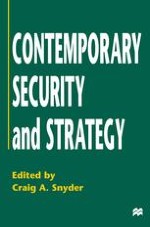
1999 | OriginalPaper | Chapter
Contemporary Security and Strategy
Published in: Contemporary Security and Strategy
Included in: Professional Book Archive
Activate our intelligent search to find suitable subject content or patents.
Select sections of text to find matching patents with Artificial Intelligence. powered by
Select sections of text to find additional relevant content using AI-assisted search. powered by
The study of security has been transformed by the ending of the Cold War. This has forced a major rethink about the basic assumptions underlying security studies. At stake are some of the key concepts in security studies in particular and international relations in general: security, power, conflict and the nation state. For 50 years academic theorising about international conflict was dominated by the Cold War and bipolarity. Academics and policy makers alike sought to explain and predict conflict within the international ‘system’. However they were not necessarily interested in conflict per se, but focused upon conflict between the superpowers. This was partly a result of the fact that most of these Cold War security theorists saw the world in terms of the realist paradigm. Realists argue that the international system is anarchic in nature and that states act to maximise their power or security. As such the actions of the strongest states are of most concern to students of the international system.